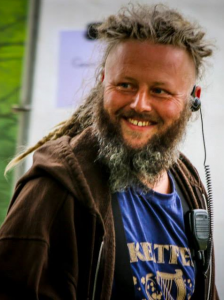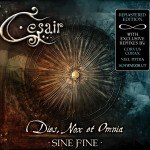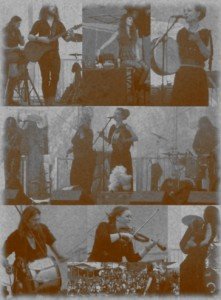At Keltfest 2015 we had a very open and heartfelt talk with none other than Mark van der Stelt, one of the driving forces behind Castlefest and everything Vana-related!
On this rainy but beautiful festival day we talked for almost 45 minutes about the festival scene, how Castlefest and other festivals came to light. We talked about the importance of music and creativity, and of course about the future!
Because Mark was so kind to take a lot of time for us we had to cut the interview into three parts, of which the second part is released today! Mind you, it’s audio only, though you can find the written text right here. 🙂
And of course, stay tuned for part 3 🙂
CeltCast: Well, you know, you have become like a godfather to this scene for a lot of people. I know you are probably to modest to accept that title…
Mark: That’s too much credit, really!
CeltCast: But really, people have, I think, really developed into themselves because of festival scenes like this. You’ve created an atmosphere in which they could. Take Brunhilde who now designs her own clothes and makes a living out of it, or Lunadea who stepped into the more pagan scene and has found grounds here to, you know, have her own public come over here and do her thing.
Mark: We give, together with other festival organizers, we give a platform. A place where they could do their thing. But more than that we don’t give them. So the creativity comes from themselves, and when they go for that they can make beautiful things.
CeltCast: You said music was central when you started out. What does music mean to you?
Mark: Everything. From our youth, my wife’s and mine, music always has been a main part of my life.
CeltCast: Do you remember the first album or single that you bought?
Mark: I think it’s Thriller from Micheal Jackson. I don’t know what LP or song it was for Natasja, but it will probably be some kind of hard rock band. She was very much into hard rock. And we like about everything, except a few kinds of music we don’t like, most kinds of music we like.
CeltCast: And when did you come into contact with the more Celtic, or Pagan/Viking scene?
Mark: Visiting Elf Fantasy or Anno Domini in Limburg and MPS. There we got in contact with that kind of music, and Celtic Festival before it was named Schotland Festival.
CeltCast: And what about yourself? Do you play an instrument yourself?
Mark: I’ve tried desperately to learn to play the guitar, but I don’t have the patience or the skills to do that.
CeltCast: I know what you’re saying, I’ve been there myself. But have you ever dreamed of being in a band yourself?
Mark: Yeah, that’s why I bought the guitar. I wanted to be famous and be a rock-star like most kids I guess.
CeltCast: For me music is equal to emotion. It’s like a thought or an emotion put into sound. What is the last song that made you shed a tear?
Mark: I don’t know which song it was, but it was at Wave Gotik Treffen last weekend at the show of Cesair and it was so, that show was so good, that I got tears in my eyes. But I like the music program on Dutch television “Best Singer Songwriter” and there are pearls that can really touch your inner emotion.
CeltCast: Ah, here’s Soar Patrol starting now. I haven’t seen many people shedding tears at Soar Patrol but ehm…we went from the rain in the background now to Soar Patrol. But is that how you find the new bands for your festivals, visiting MPS or…?
Mark: Visiting as much festivals as possible yeah.
CeltCast: Because there are a lot of uncut gems out there.
Mark: Next to that we get, almost every week, CD’s in our postbox, or emails, and sometimes there are very very nice rough diamonds in that. And then we try to visit them at a concert because we don’t book bands we, or someone we trust, haven’t seen themselves play live. If we don’t see a band play live, we don’t book them.
CeltCast: So that’s the secret to getting in to Castlefest for a young band? They have to invite you to a live show so you can watch them perform?
Mark: No, first send a CD. All CD’s are listened to, and when we think of possibilities to put them on one of our stages then we get in contact with them. And then after that we find someone, perhaps, who has seen them already, because if a band plays gigs already, they play gigs at a certain festival, and then we find out who has been to that festival and if they have seen them.
CeltCast: Last year a group called Pyrolysis crashed Keltfest here. They just went in with their instruments and started playing. Which is kind of daring of course.
Mark: Yeah, they sent me an email asking if they could play on Keltfest and I said “our stages are full, I don’t have a place anymore.” And they said “but could we play on the terrain?” I said “sure, ok, no problem.” And they did an it was nice. They made a party out of it and this year we booked them for the camping stage at Castlefest.
CeltCast: Brilliant! We love them. We did an interview with them yesterday and we think they are marvelous. They have a bright future ahead. Well, you do Keltfest as we mentioned, Castlefest, but you also have other festivals?
Mark: Yeah. We have our medieval festival, Middeleeuws Spektakel, where we start a stage this year, first time. Before, the other years, it was just knights on horses and totally medieval entertainment, so now we added a stage to that to make it more interesting, also for ourselves. We have two editions of that, one in Dordrecht and one in Amsterdam. Then we have our Halloween festival, Haunted Castle, which is really a Halloween festival with haunted houses, scary acts, a lot of costumes. And this year we had our first Castlefest Winterparty and we will have, next December, our first real Castlefest Winter Edition in Lisse.
CeltCast: Real, as in outside, because the other one was in a theater of course. It was totally crammed. It’s a good sign of course!
Mark: It’s not that we want to expand or anything, that’s never the goal, but we have so many ideas and so many dreams, and a Winter Edition was one of them. And now we have the possibility to go and explore our dream.
CeltCast: Yeah, and of course there are people coming to those. I mean, it’s like you said a natural evolving scene. You started Castlefest with like 8000 people the first year?
Mark: 5500.
CeltCast: 5500? And last year I believe you had like over 30.000.
Mark: yeah, 32.000.
CeltCast: There were people waiting for an hour in their car, you had to hand out water bottles to keep them hydrated. It’s amazing.
Mark: And what’s even more amazing is that that was our tenth edition, so we expected to have a lot of extra visitors. Not this much, but we expected growth. But we thought the next year, the eleventh edition, will be a bit less crowded or the pre-sale shall be less. That’s what we expected. But at this moment we sell much more tickets than we did last year. We sold already 150% of what we sold at this moment last year. So we don’t understand. But for us it’s never a goal to have more visitors or to get bigger, but it’s always the consequence because now we know we sell that much tickets in pre-sale we think OK, but if all those people come and we have that same growth at the door, what will happen and how are we going to entertain all of them and how can we get all of those people on the terrain?
CeltCast: Yeah, because you already expanded a couple of times.
Mark: Yeah, and there is not much more space, there’s no more space extra to get. So what we are trying to do now is changing the terrain so we split the public more, and pull them to all the sides of the terrain so it’s less crowded, it feels less crowded. That’s really important. The feeling and the quality of the festival is more important than how much people we can push into that. And we have ideas about that. But if the sale will go on like this there could be a possibility that we will sell out in the pre-sale for the Saturday. We don’t know if the sales will go on like this but we anticipate on that possibility at this moment.
CeltCast: Wow! Well, if people are aware of this I’m sure you’ll get another run on tickets ’cause nobody wants to miss out. Last year you did something new. You had a live feed streaming on YouTube. Bastaard, of course who already made lots of videos and does wonderful camera work for you, they innovated. You reached people in Brasil or all across the world, it was a huge success.
Mark: Yeah, that’s the same growing thing as we were talking about earlier. Bastaard does his film shootings at all fantasy festivals in Holland and make very nice compilations, and Erik, Erik Wildeman, who does now all registrations at, all stage videos at Castlefest for us, grew so much in the couple of years we are working together, we tried to find new things together and last year it was the live stream. We didn’t promote it, at all, until we really knew that it would work. So the first time we ever told anyone about the live feed was when the first band was on stage. And it worked and we said OK, now we put on Facebook that we have a live stream. And we had a lot of visitors on that. It was a real success. So we will do that again this year and add a new extra to it by putting a LED screen on the festival terrain so the public can also see more. Because sometimes it’s so crowded, you can’t even see the stage. And then they can see the show also.
CeltCast: So you reached out to people abroad. I don’t know if you can measure this, but can you see in the pre-sales that people from abroad, more are actually visiting Castlefest?
Mark: I could probably see that but I didn’t check that yet. But we have visitors from all over the world.
CeltCast: And how about the other way around? Because the Netherlands is only so big. Do you have plans on going abroad?
Mark: That question is asked us since I think our third or fourth Castlefest. “Please bring Castlefest to Belgium, Germany, France.” And the we always said “No, we’re not going to do that.” Because it’s too risky, it’s too difficult. We don’t know the culture good enough, we don’t know the rules good enough. But last year when we were at Trolls & Légendes in Belgium I said to my wife “I think I’m not willing to say no all the time.” Because there I got the same feeling I had when we came with the idea of organizing a market, what eventually went to Castlefest, what became Castlefest. And we very much want to follow our feelings, so if we feel that, we try to open up the possibility, and if something happens then, perhaps, who knows? And in this particular idea, when I told just one person that I would probably, if someone would ask me now I would probably not say no again, but who knows. And after that so much happened! So yeah, we are going to organize a festival in Belgium next year. The guys from Bastaard had it right!
CeltCast: “Kastelenfeest” all along! Congratulations! I think you will be changing people’s holiday destinations, depending on the time of the year of course.
Mark: Perhaps. The time of the year is already…we already know where and when it will take place. We are even already in contact with bands for that festival. At this moment the website is created, so we are working hard on the background to present it to the world, and we will present it before Castlefest.
CeltCast: OK, well we will sure be helping you along to let the world know that Castlefest is coming to Belgium!


